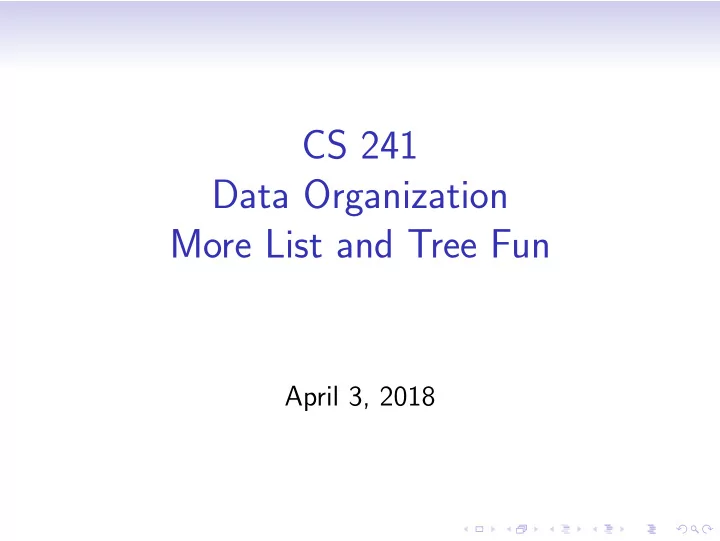

CS 241 Data Organization More List and Tree Fun April 3, 2018
Pointer Changing Code What do we do if a function needs to change one of the pointer parameters passed to it? Assume we have struct Node* root that points to a tree. • We could use pointers to pointers. void changeTree(struct Node ** node ); changeTree (& root ); • We could have the function return new pointer value. struct Node* changeTree(struct Node* node ); root = changeTree(root );
Ordered Binary Tree root 4 2 5 1 3
Circular Doubly Linked List 1 2 3 4 5 head First and last nodes wrap around to each other. Null pointer represents an empty list. 1 Length 1 list looks a bit silly. . .
Common Node “Shape” struct Node • In tree, right and { left are greater int data; struct Node* left; and lesser struct Node* right; subtrees. }; • In list, right and left are next and previous nodes.
Tree to List Challenge Take ordered binary tree and rearrange the pointers to make a circular doubly linked list. This operation can be done in O(n) time.
Tree to List /* Given root node of binary tree , * convert to list and return head node. */ struct Node* treeToList(struct Node* node ); • How will this function work? • What helper function(s) will we want?
List helpers /* Given two circular doubly linked lists , * append them and return new head node. */ struct Node* joinLists(struct Node* a, struct Node* b); /* Join two nodes so second follows first. */ void joinNodes(struct Node* a, struct Node* b) { a->right = b; b->left = a; }
joinLists struct Node* joinLists(struct Node* a, struct Node* b) { struct Node* aLast; struct Node* bLast; if(a == NULL) return b; else if(b == NULL) return a; else { aLast = a->left; bLast = b->left; joinNodes(aLast , b); joinNodes(bLast , a); } return a; }
treeToList struct Node* treeToList(struct Node* node) { struct Node* left; struct Node* right; if(node != NULL) { left = treeToList(node ->left ); right = treeToList(node ->right ); node ->left = node; node ->right = node; node = joinLists(left , node ); node = joinLists(node , right ); } return node; }
Recommend
More recommend